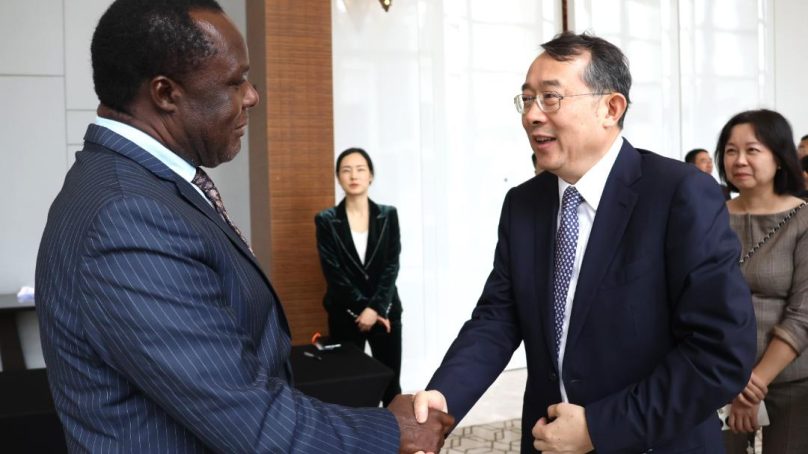
Industry Principal Secretary Juma Mukhwana has called on Chinese investors to grow their investment in Kenya as a way of strengthening the historic economic ties between the two countries.
Dr Mukhwana noted the need for Kenyan investors to also take advantage of the recently signed China- Kenya trade and economic agreements as well as the removal of tariffs on Kenyan exports to China to grow Kenya’s export portfolio.
Speaking during the Kenya-China (Shenzhen) Economic and Trade Exchange and City Branding Conference in Nairobi, Mukhwana said that Kenya being a strategic gateway to Africa, presented a number of opportunities for manufacturing, agro- processing and cultural tourism and technological innovations.
“Kenya offers unmatched potential for trade and investment. It is the gateway to the East and Central Africa, with access to over 400 million people through regional blocs such as the East African Community and the Common Market for Eastern and Southern Africa-COMESA.
“As we speak, Kenya has trade agreements that can cover half of the world, meaning this is a huge market that we need to tap into, for processed goods,” Mukhwana said and urged Chinese investors to tap into the opportunity.
He invited Chinese investors to take advantage of government-allocated land for the County Aggregation and Industrial Parks (CAIPs) across counties, noting, “We want Shenzhen-based companies to build, operate and eventually transfer these facilities to Kenyans, through industrial partnership.”
Kenya is emerging manufacturing zones ranging from Export Processing Zones (EPZs) in Athi River to Special Economic Zones (SEZs) in Dongo Kundu, Eldoret and Naivasha, are set to benefit from such collaborations, especially as the country seeks to raise its manufacturing contribution to GDP from 7.6 per cent to 20 per cent by 2030.
“For example, Kenya is already Africa’s top avocado producer and a leading exporter of tea, coffee and flowers. We want to shift from exporting raw materials to high-value processed goods that will create jobs locally and increase the value of our products
At the Conference, Kenya and China’s tech-driven city of Shenzhen, pledged to strengthen economic ties and deepen trade collaboration in a bid to accelerate industrial growth, regional trade, and sustainable economic development.
“Investing in Shenzhen is investing in the future, but more importantly, investing in Kenya is investing in Africa’s future,” said Wang Qiang, president of the Shenzhen Overseas Friendship Association.
Qiang added, “Shenzhen, which is China’s innovation powerhouse and home to global tech giants including Huawei, ZTE, Tencent and BYD, is now looking to expand its investment footprint in Africa, starting with Kenya. We believe partnering with Kenya’s private sector can bring mutual value and innovation. Also, investing in Shenzhen is investing in the future and expanding investment in the world. We invite people of all walks of life, to come live, study and invest in the city of Shenzhen.”
Chinese firms, particularly from Shenzhen, expressed strong interest in sectors such as agro-processing, electric mobility, electronics assembly, pharmaceuticals and construction materials.
President of the Shenzhen General Chamber of Commerce, Wan Chan, highlighted how Shenzhen’s transformation from a fishing village to a global tech and industrial hub, can offer critical lessons for Kenya, which is currently developing CAIPs to spur local manufacturing.
The two sides discussed opportunities for setting-up assembly plants for agricultural machinery, automobiles that are highly demanded in Kenya and across the region.
The forum also highlighted the increasing focus on the pharmaceutical sector, where local production of products such as syringes and drugs was seen as essential to improving healthcare access.
Kenya’s tourism sector, which welcomed over 91,000 Chinese visitors last year, was also an area of interest for investment, especially in hotel development and eco-tourism infrastructure, as Kenya focused on growing the number to a million, over the next decade.
China’s exports to Kenya hit approximately $ 8.58 billion in 2024, against Kenya’s average of $24.257 million. Recent moves to remove a longstanding 10 per cent export tariff on Kenyan goods to China were praised by business leaders as a significant step forward.
“We are no longer just looking for imports, but inviting investment in production,” Mukhwana said. “Chinese businesses that manufacture in Kenya will gain access to regional markets, tax holidays and preferential trade agreements with the United Kingdom, United Arab Emirates, Africa itself and the US- Kenya Economic partnership whose negotiations are at the tail end.
Kenya also boasts a youthful, tech-savvy population, offering a ready labourforce and growing consumer market. With Shenzhen companies contributing over $708 million in imports to Kenya in 2023, the potential for balancing trade through joint ventures and local manufacturing is now a top priority.
Minister-Counsellor at the Chinese Embassy in Kenya, Zhou Zhencheng, emphasized Shenzhen city’s unmatched business ecosystem, with over four million commercial entities and 579 listed companies, including 10 Fortune Global 500 firms.
Its industrial capacity, innovation prowess and logistical efficiency make it a key partner for any country looking to scale up industrialization. As 16 Chinese companies from Shenzhen tour Kenya seeking opportunities in manufacturing, cultural tourism, logistics, and technology, both sides are optimistic about a new era of cooperation.
“With shared values of innovation, inclusivity, and sustainable growth, the Kenya-Shenzhen partnership is emerging as a blueprint for economic transformation across the continent,” added Zhuo Wu, President of the Kenya Chinese Chamber of Commerce.
- A Tell Media / KNA report / By Anne Sabuni








